Is it possible for pregnant women to dill: harm and benefit for the expectant mother and child
Dill is a universal seasoning with worldwide popularity. In the pharmaceutical industry, this green is widely used in the composition of medicines: the plant contains a rich set of substances and trace elements useful for health.
During pregnancy, almost all women face certain difficulties - the body begins to rebuild and live “for two”. Dill-based drugs will theoretically help to cope with edema, digestive problems, toxicosis and anemia, as herbal remedies with a minimum number of side effects. But is the familiar plant so safe? Let's figure out whether it is possible for pregnant women to dill and what surprises the usual seasoning conceals.
The content of the article
Dill chemical composition
Dill odorous is an annual herb that has a number of useful properties... It contains vitamins and minerals necessary for the body, while the composition of greens and mature seeds is different.
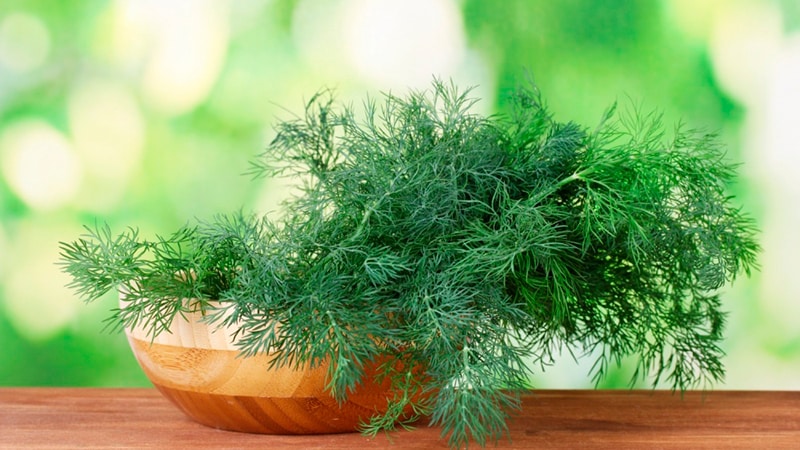
Fresh greens are rich in vitamins C and B9, as well as iron. These components stimulate blood formation, which is why dill is so useful in the prevention of anemia.
The composition of dill greens is presented in the table:
| Nutritional indicator | Amount in 100 g of edible plant part | % of the recommended daily intake |
| Calorie content | 43 kcal | 2% |
| Water | 85.95 g | — |
| Carbohydrates | 4.92 g | 2% |
| Alimentary fiber | 2.1 g | 11% |
| Fats | 1.12 g | 2% |
| Protein | 3.46 g | 6% |
| Vitamin A | 386 mcg | 43% |
| Vitamin C | 85 mg | 94% |
| Vitamin B1 | 0.06 mg | 4% |
| Vitamin B2 | 0.3 mg | 17% |
| Vitamin B5 | 0,4 mg | 8% |
| Vitamin B9 | 150 mcg | 38% |
| Vitamin PP | 3.37 mg | 17% |
| Potassium | 738 mg | 30% |
| Calcium | 208 mg | 21% |
| Magnesium | 55 mg | 14% |
| Sodium | 61 mg | 5% |
| Phosphorus | 66 mg | 8% |
| Iron | 6.59 mg | 37% |
| Manganese | 1.26 mg | 63% |
| Copper | 0.15 mg | 15% |
| Zinc | 0.91 mg | 8% |
Dill seeds have other qualitative and quantitative indicators of nutritional value. They contain fewer vitamins and more minerals than greens.
The composition of dill seeds is presented in the table
| Nutritional indicator | Amount in 100 g of dry seeds | % of the recommended daily intake |
| Calorie content | 305 kcal | 15% |
| Water | 7,7 g | — |
| Carbohydrates | 34.07 g | 12% |
| Alimentary fiber | 21,1 g | 106% |
| Fats | 14.54 g | 22% |
| Protein | 15.98 g | 27% |
| Vitamin A | 3 μg | 0% |
| Vitamin C | 21 mg | 23% |
| Vitamin B1 | 0.42 mg | 28% |
| Vitamin B2 | 0.28 mg | 16% |
| Vitamin B6 | 0.25 mg | 13% |
| Vitamin B9 | 10 mcg | 3% |
| Vitamin PP | 2.81 mg | 14% |
| Potassium | 1186 mg | 47% |
| Calcium | 1516 mg | 152% |
| Magnesium | 256 mg | 64% |
| Sodium | 20 mg | 2% |
| Phosphorus | 277 mg | 35% |
| Iron | 16.33 mg | 91% |
| Manganese | 1.83 mg | 92% |
| Copper | 0.78 mg | 78% |
| Selenium | 12.1 μg | 22% |
| Zinc | 5.2 mg | 43% |
Useful properties and possible harm of dill
Dill has a number of useful properties:
- has a beneficial effect on the process of hematopoiesis and is used to prevent anemia;
- B vitamins regulate the functions of the nervous, musculoskeletal and cardiovascular systems;
- vitamin A stimulates the regeneration and renewal of the epithelium;
- C - prevents the destruction of cells by free radicals, participates in the synthesis of collagen and proteins, which indirectly stimulates immunity, strengthens blood vessels;
- iron, copper and manganese - components of liver enzymes, are involved in hematopoiesis;
- zinc synthesizes insulin, therefore it is indispensable for diseases of the digestive tract, liver and for the prevention of diabetes.
However, excessive consumption of the seeds and greens of fragrant dill is not recommended due to the high content of essential oil. The maximum daily dose of oral administration is 0.2 g.
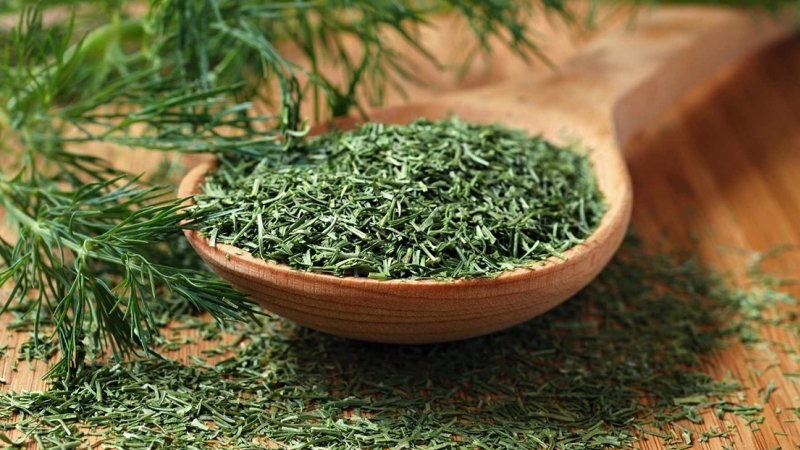
Fresh herbs contain up to 1% essential oil, dried seeds - up to 4%.Therefore, a healthy person can eat up to 20-30 g of dill and no more than 5 g of seeds.
The components of fragrant dill essential oil include:
- alpha fellandrene (10-60%);
- limonene (30-40%);
- dilether (3-10%);
- carvone (30-14%).
Essential oil components have a stimulating effect on the body even in small doses:
- have an aromatherapy effect, help with insomnia, stress, neurosis;
- relax the smooth muscles of the intestines, prevent flatulence, constipation, bloating;

- reduce the activity of pathogenic intestinal microflora, reduce inflammation in colitis;
- have a bactericidal effect, do not cause irritation when applied to the skin, therefore they are used without dilution;
- have a diuretic effect, reduce inflammation in cystitis;
- cause bile secretion, help with gallstone disease;
- increase the secretion of mammary glands in nursing mothers;
- with inhalation, they relieve inflammation of the throat and bronchi;
- reduce blood pressure by relaxing vascular smooth muscle.
Another property of dill essential oil is its effect on the hormonal activity of the body. Dill oil increases levels of estrogen, dopamine, serotonin, oxytocin and melatonin, while lowering adrenaline and cortisol levels.
Dill consumption during pregnancy
During the time of Tsarist Russia, the method was widespread among the peasants early termination of an unwanted pregnancy with a strong decoction of dill. For this, shoots with umbrellas were boiled in clay pots so that the broth contained the greatest amount of essential oil.
reference... According to research by CMVP (European Committee for Medicines founded in 1999), dill essential oil causes an increase in oxytocin levels. This provokes uterine contraction and placental discharge with profuse uterine bleeding. Pregnant women after such an artisanal abortion often died of blood loss. Therefore, essential oil, as well as strong dill decoctions, are forbidden to be used internally by women during pregnancy at any gestation period.
However, dill greens in an amount of up to 10 g will help expectant mothers in the prevention of anemia, as well as in case of digestive problems. It contains enough nutrients for a healthy baby.

To reduce the amount of essential oil in the portion eaten, dill is best added to dishes in dried form... At the same time, dill seeds are excluded from the diet, even as part of bakery products. They contain enough essential oil to induce spasms of the smooth muscles of the uterus.
In the later stages of pregnancy, exceeding the norms for the use of dill provokes premature birth. Small portions of dried herbs up to 10 g, on the contrary, will prepare the body for lactation. So that the mother will have the opportunity to breastfeed the baby, especially if the pregnancy is the first.
The use of dill during pregnancy for medicinal purposes
The beneficial properties of dill make it possible to use it for medicinal purposes when carrying a child. It is important that the content of essential oil in the decoctions does not exceed 1%.
Dill water
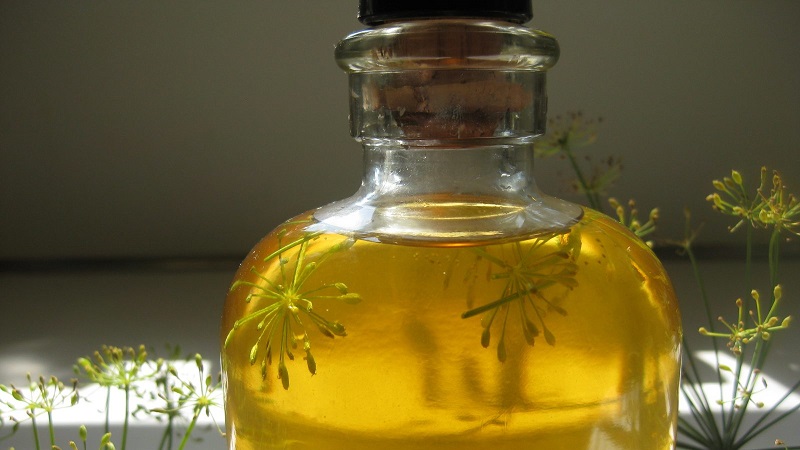
This medicinal product contains 0.001% essential oil. It applies:
- with a decrease in appetite - 1 tbsp. l. before eating;
- with flatulence - 1 tbsp. l. 4-6 times a day;
- with nausea - rinse your mouth with dill water to reduce vomiting.
To prepare dill water, 1 g of essential oil is dissolved in 1 liter of pure water. You can make dill water at home from dill seeds, according to the instructions on the package. It kept 30 days in a cool, dark place.
Dill tea is used in a similar way: 1 tbsp. l. chopped greens are infused in 250 ml of boiling water.
Dill seed decoction
The broth contains up to 3% essential oil. When taken orally, such a dose provokes spasms of the smooth muscles of the uterus, therefore, it is used only externally for edema.
Broth preparation method:
- 15 g of seeds are poured over 250 ml of boiling water.
- The resulting infusion is boiled over low heat for 10 minutes.
- The broth is filtered and cooled to room temperature.
- Cotton swabs are moistened in it, moistened and applied for 10 minutes.
Store the broth for no more than a day in a cool, dark place (in the warm season, a refrigerator is suitable).
In addition to dill seeds, mint, sage, chamomile and green tea can be added to this broth.
Attention! If the problem of puffiness is not resolved after using external medicinal and cosmetic products, consult your doctor for advice.
Essential oil and dill tincture
It is used as an aromatherapy remedy for colds. The components of the essential oil have an antiseptic effect. During the cold season, small amounts of essential oil are added to the aroma lamp to scent the rooms. The session lasts no more than 20-30 minutes.
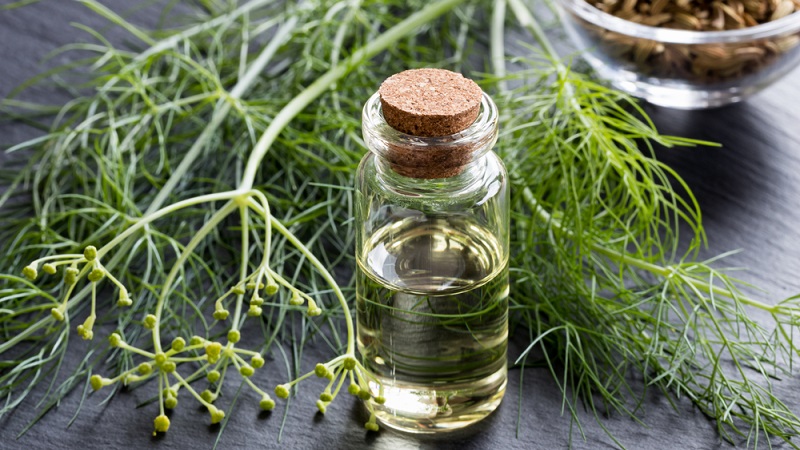
Dill seed tincture is added to baths during the first symptoms of a cold. The water temperature should not exceed + 38 ° C, and the duration of water procedures should not exceed 20 minutes.
Preparation of dill tincture:
- Dill seeds, purchased in a pharmacy, are washed from dust in a sieve.
- 300 g of seeds are poured into a container with a volume of 3 liters, filled with 40% alcohol solution to the neck and hermetically sealed.
- Insist in a cool dark place for 2-3 weeks.
Seed tincture contains up to 7% essential oil. Essential oil components penetrate the bloodstream through the skin, overcoming the lipid barrier. Therefore, during pregnancy it is not recommended to apply undiluted tincture or cosmetics with dill essential oil.
Precautions and contraindications
It is not recommended to use medicines based on the essential oil of fragrant dill in the first trimester of pregnancy, as there is a high likelihood of uterine bleeding and miscarriage... In the first weeks, especially carefully monitor your diet, since the growing fetus at this stage is just forming and is sensitive to substances that are contained in the mother's blood.
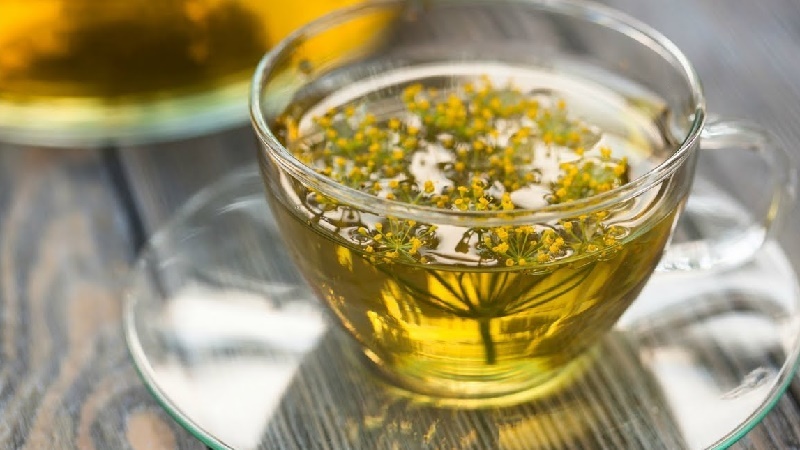
With an increased immune status or a tendency to allergies, dill is also excluded. With instability of immune reactions, the mother's body can attack the fetus and provoke a miscarriage, perceiving the tissues of the embryo as foreign. It is also recommended to exclude the use of dill-based products with increased uterine tone.
As a seasoning, it is allowed to use up to 10 g of dried dill per day. It is better to exclude seeds and fresh herbs from the diet, since the content of essential oil in them ranges from 0.5 to 4%.
Since dill relaxes the smooth muscles of blood vessels and internal organs, it is not recommended to use it for diarrhea, gastroesophageal reflux (reflux of gastric contents into the esophagus), low pressure and urinary incontinence.
Conclusion
During pregnancy, the uncontrolled intake of dill as part of dishes and medicines based on dill essential oil is harmful. This increases the level of oxytocin in the blood, which causes preterm labor.
During pregnancy, no more than 10 g of dried herbs are allowed. Medicines and cosmetics with dill essential oil are applied only externally in a diluted form. If you follow the precautions, your pregnancy will go well.